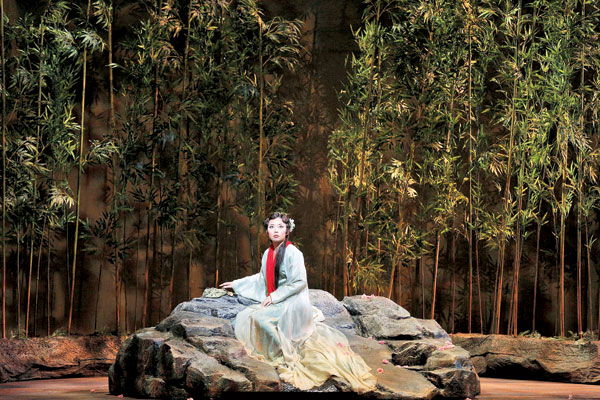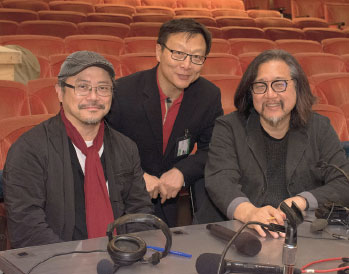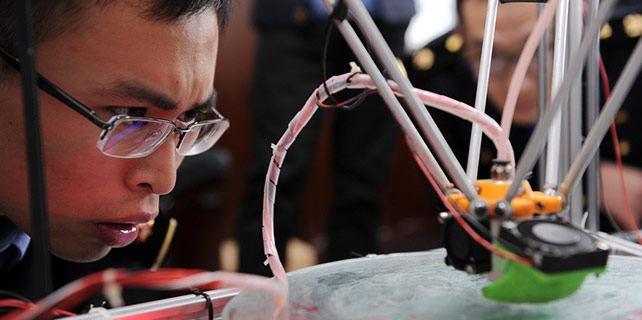Chinese epic novel comes alive in opera
 |
|
A scene from Dream of the Red Chamber, "The Burial of the Flower Petals." PHOTO COURTESY THE SAN FRANCISCO OPERA |
"The success of an opera depends on it engaging the audience emotionally. I think we did our best and have some success," said Bright Sheng, composer of the new opera Dream of the Red Chamber.
It's a daunting task to adapt the 18th century Chinese masterpiece novel - which is twice as long as Tolstoy's War and Peace - into a two-hour Western opera.
"There was tremendous pressure - you need not only to deliver the work, but also an excellent work," said Sheng, who has been immersed in the opera for the past two years.
The work has drawn media buzz as well as wide attention from the general public since it premiered on Sept 10 at the War Memorial Opera House in San Francisco and Sheng is braced for the critics.
"It's impossible that everyone will like it," he said. But the applause, laughter and tears from the audience prove that his goal of "engaging the audience emotionally" has been achieved.
Calling himself a "dilettante redologist" (the term for an academic devoted to studying the classic Chinese novel), Sheng said he first read Dream of the Red Chamber when he was 12 during the "cultural revolution" (1966-76) and had read the novel every 10 years or so since, including two more times since getting the assignment to write the opera.
Sheng said he took the job, commissioned by San Francisco Opera, because the epic novel is great operatic material where music can play an essential role.
At the centre of the plot is a love triangle involving Bao Yu, a young aristocratic fop, and his two female cousins - beautiful soulmate Dai Yu and his also beautiful future wife Bao Chai - against the backdrop of the fall of the illustrious Jia clan.
"It's the first novel in Chinese literary history that depicts characters' detailed sentiments with exquisite writing," said Sheng.
|
Bright Sheng (center), composer of the opera Dream of the Red Chamber, with Tim Yip (left), the production designer and Stan Lai (right), the director. Provided To China Daily |
The novel has been adapted countless times into film, drama and twice into popular TV series in China. But unlike formats that rely on dialogue, opera has a lot more to do with expressing the characters' inner monologues or and exaggerating their unconstrained feelings.
"Music carries emotions that words cannot explain or say," said Sheng.
One of the most emotionally charged scenes is the Burial of the Flower Petals in Act II, when Dai Yu finds her world growing bleaker as her health continues to decline.
"When spring had fled and beauty is spent, who cares for the fallen petals?" she sings.
"My wife asked me why the fragile Dai Yu sings in such a loud voice," said Sheng. "To me, it has to be loud crying, beating one's bosom as she looks to the heavens to ask these questions."
Sheng understands that the expression of human emotions is a way to empower a musical work and his music is naturally influenced by his cross-cultural experiences.
Born in 1955 in Shanghai into an intellectual family, he was exposed to traditional Chinese and Western music at a young age. His father, a radiologist, played the jinghu, a two-stringed fiddle, for Peking operas and taught Sheng to play. His mother, an engineer, studied piano growing up and started giving him lessons when he was 4-years-old.
But it was his experience as a percussionist with an art troupe in Xining, a remote northwestern region in China, at the age of 16 that really made him interested in composing and got him fascinated with the sensuality and the roughness of the local folk music.
After graduating from Shanghai Conservatory of Music where he studied composition from 1978-82, Sheng moved to New York City and continued studying composition at Queens College, City University of New York, earning his MA in 1984.
Grounded in the Western classical tradition, he has freely drawn on his heritage for material and his score is marked with Chinese influences.
He was proclaimed by the MacArthur Foundation in 2001 as "an innovative composer who merges diverse musical customs in works that transcend conventional aesthetic boundaries."
"I consider myself 100 percent Chinese, and 100 percent American," said Sheng. "I am thankful to be able to come up with something that is authentically and deeply felt. You have to have a profound understanding of Chinese culture, in this case, and Western culture."
After the world premiere in San Francisco, the opera will be performed on March 17 and 18 at the Hong Kong Cultural Center as the finale of the 45th annual Hong Kong Arts Festival. Sheng said he was also in talks to take the opera to the National Centre for the Performing Arts in Beijing, probably in a Chinese-language version.
"This is the best I've done in terms of opera," said Sheng. "But I still have a long way to go. I think I'll get better with the next opera and the one after that."
liazhu@chinadailyusa.com

















